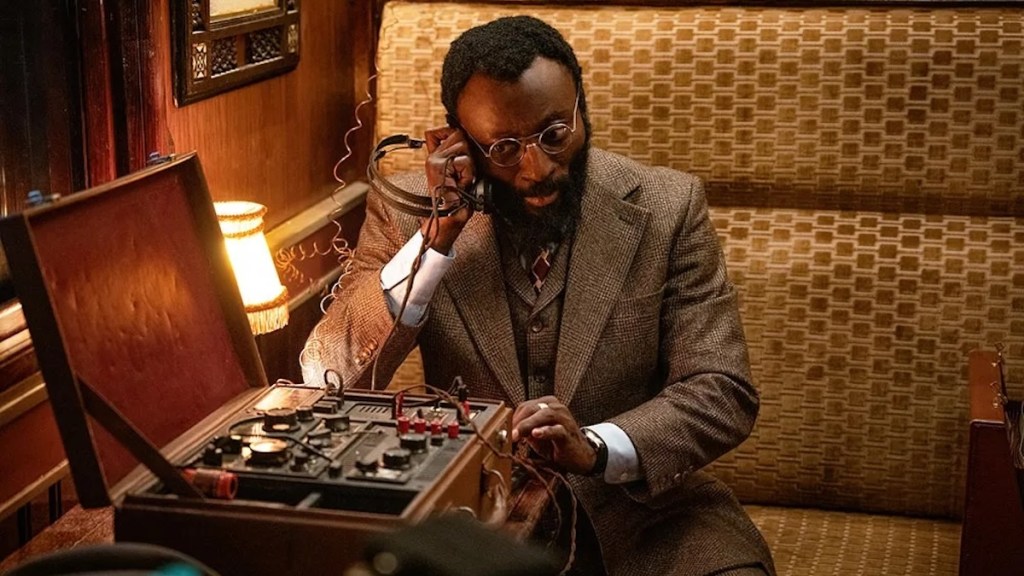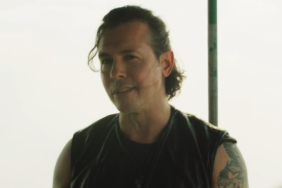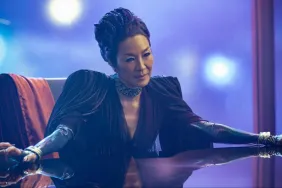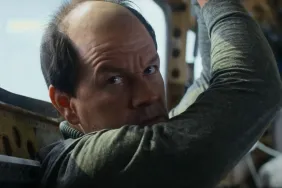ComingSoon Editor-in-Chief Tyler Treese spoke with The Ministry of Ungentlemanly Warfare star Babs Olusanmokun about his role as Richard Heron in the movie, plus grappling with director Guy Ritchie. The Ministry of Ungentlemanly Warfare is now available on Premium Video on Demand and Premium Electronic Sell-Through from Lionsgate. It will come out on 4K, Blu-ray, and DVD on June 25.
“Directed and co-written by Guy Ritchie, this action-comedy tells the incredible true story of the first-ever special forces organization formed during WWII by UK Prime Minister Winston Churchill and a small group of military officials including author Ian Fleming,” says the synopsis. “The top secret combat unit, composed of a motley crew of rogues and mavericks led by Gus March-Phillipps (Henry Cavill), goes on a daring mission against the Nazis using entirely unconventional and utterly ‘ungentlemanly’ fighting techniques. Ultimately, the task force’s audacious approach changed the course of the war and laid the foundation for the British SAS and modern black ops warfare.”
Tyler Treese: How did you first get connected with Guy Ritchie? I know you worked on Wrath of Man before this. Did you guys connect through jiu-jitsu?
Babs Olusanmokun: Not at all. Like, yeah, we, we trained jiu-jitsu together many, many years ago, but he didn’t even remember that. The reality is I was living in Brooklyn, and I sent in a self-tape for Wrath of Man. Subsequently, like three weeks later, I moved to London. The casting person found out I was in town, and all of a sudden they really tried their best to get me on that film, and that was it. Three days into that shoot, then I reminded him like, we’ve actually been together. You actually trained with me many years ago
How is he on the mat? How is it rolling with him?
Oh, he was good. He was very good back then, and he got even better because he’s also a black belt for many years now, so, yeah.
In The Ministry of Ungentlemanly Warfare, you have this great role as Richard Heron. You’re really setting things in motion here. It’s a very active, very fun role. What did you like most about your part in the plot of this film?
Just what you said, he was helping to set it up, being a sort of throughline through the story along with Eiza [González]. I thought that was really wonderful to have an opportunity to play with that.
You have a lot of great scenes with Eiza, and she just shines throughout. What stood out about her as a scene partner?
She was super collaborative, you know, she was warm. We really got on well together, so it was really wonderful to work with her. We gave each other space, and just really met within the work in a really lovely way, and that was it. That’s all you need.
She seems like a delight, but Til Schweiger is just so intense and so unlikable in this film. How was that dynamic on set and working with him? I know he is a very talented director as well as an actor, but, boy, he’s horrible in this as a character.
Absolutely. Listen, he was wonderful to work with. He came and he did his thing. He was good to interact with. He was very complimentary of everybody. He was really excited to be working with Guy. He really was. He was very excited about our train scene with myself and Eiza. There was a day he saw that and he just went on and on about it. He really loved it. So yeah, he was very cool to work with.
One of my favorite scenes in the film is the one where you’re planting a bomb, you get caught by the Nazis, and then you turn the tables on them. What was it like filming that sequence? That’s such a fun exchange.
That was cool. That was like one of those, like, you’ve seen it before, and now you get to do your version of it. So to have that warehouse to myself and all of a sudden to have these guys behind me. We planned, of course, the rig of the pistols a while back. So it was very, very cool to finally have the opportunity to pop that out and get rid of these guys, you know?
Now that you’ve worked with Guy multiple times, what was it like coming back for this project where you already have a rapport with him and what he wants from an actor? Is that helpful from your end?
Absolutely. Of course, this role was more substantial than my role in Wrath of Man. So the relationship went even deeper within the work on this. It was fantastic. He was right there really giving his notes, giving the new dialogue every morning, but really engaged and really just sitting there and making sure he was getting what he needed. It felt like we were cooking something and I could see him very excited about what we were doing. I’m already excited. Eiza was already excited, so we just had a lot of fun. We just had a lot of fun working with Guy.
Since you do have such a decorated jiu-jitsu background, has that helped with your acting either through maybe choreography with fight scenes or just the work ethic?
I imagine in a certain kind of way. You know, both things have always been quite different for me, how I approached jiu-jitsu and martial arts. I always saw it as very separate from acting, just studying acting. But with many years of both, I realized sometimes you use the same language, and if there’s discipline, it goes a long way, focus, and movement.
At the same time, the psychological, the mental of being present or things going very wrong. If you’re not present, just like things can go wrong. Jiu-jitsu match, if you’re not present, they can go wrong. In a scene, if you’re not present at all, you won’t be present enough to receive and give. So there’s definitely some comparisons there. It’s just art in general, so I very much love both.
One role I really loved of yours recently was in Dune. I was curious because you’re not in that movie very long, but it’s such a pivotal character-building scene. It’s the apex of that first movie. It completely changes Paul’s character. So what is it like when you’re so pivotal to the movie, but you’re just in a small portion?
I remember getting that film and then being sent the script or at least that scene or the fight scene and maybe just the scene preceding the fight scene. I felt like I understood immediately what the film was going for or the story, as in, yeah, this is a guy that has to be knocked over for this person to be elevated. It’s a rite of passage, so to speak. But of course, my job was to make sure that Jamis was given a lot of life and as much truth as possible, as much of a lived life as possible, so that when we met him and, with that explosion of that fight, that his passing would be something that would stay with us. That was the challenge for me, and that’s really what I wanted to do, to make sure it wasn’t just, “This is the part where we get to the part of the movie where our hero knocks down this person,” and “Wow. Look, he’s a badass.” I wanted us to really feel the life of Jamis and maybe regret the fact that Jamis should not be dying, you know? Just bring as much truth as possible to it.
You’ve had this relationship with Rockstar Games. You were in Max Payne 3 and Red Dead Redemption 2. How did that relationship come about?
I read. I think they brought me in for an audition. It was like an acting audition, really, but it was one of those where you get maybe a monologue plus something else. The first game I did for them was Max Payne 3, and the director was very excited about what I brought into the room for him, and that was it, really. I just did this monologue. It was a very interesting process doing that.
Thanks to Babs Olusanmokun for taking the time to talk about The Ministry of Ungentlemanly Warfare.










